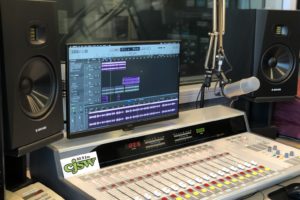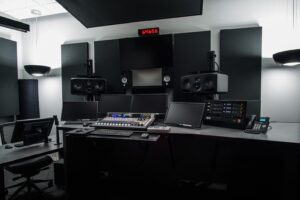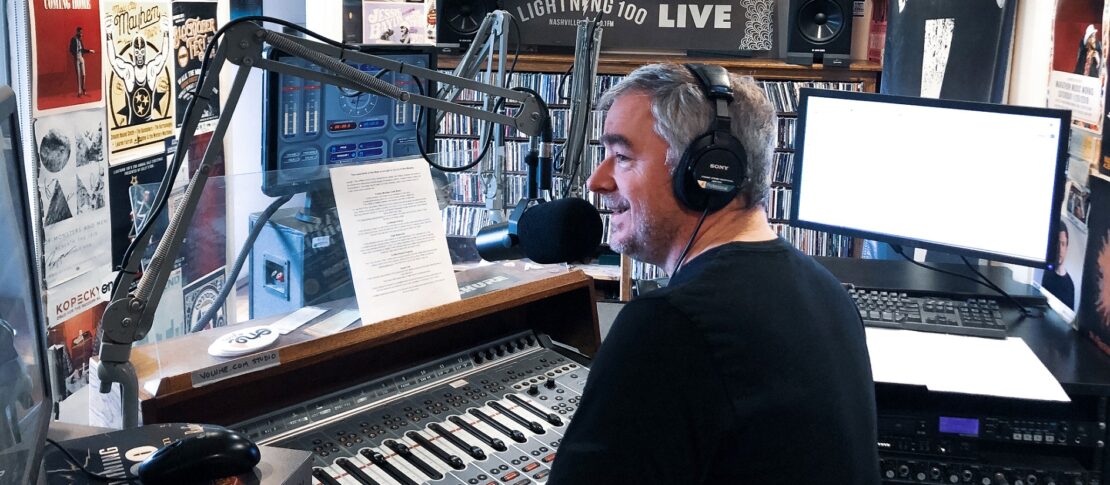
Lightning 100
Program director and request hour DJ Dan Buckley, having 20+ year tenure at Lightning 100 under the belt, talks candidly about life in Nashville, live streaming in the ‘90s, having best friends that he’s never met and why making decisions out of fear is what destroys community radio culture.
Station beginnings
There’s a conspicuous degree of intensity in Dan’s dedication to independent radio. He is more than keen to elucidate the allure of his profession – and transmits an inimitable wisdom. Perhaps this is symptomatic of the many storms he has weathered. He is light-hearted and upbeat in his delivery though, painting a verdant scene of the station’s germination in the ‘90s before elaborating in detail on the recent happenings at one of Nashville’s longest running radio stations.
Dan’s decorated career at the station began back in the summer of ‘97. He was invited on an internship by the station manager at the time after calling in on an almost daily basis for months from his ruby red Ford Mustang on the way to college. Of course, he was already studying to work in radio. For Dan, being a Lightning 100 DJ was his true calling.
“The advice my dad gave me as a kid was, ‘find out what nobody else wants to do, and do it with a smile.’ I took this onboard – and during my internship I found out that nobody wanted to set up for the morning show. I had to be there for 1am and it would take me an hour to drive there. Then I’d pick up all the gear from the Hard Rock Cafe and make my way up to the 31st floor of the building and bang on the door as hard as I could so the cleaning people would let me in at 3am.”
Dan’s initial responsibilities included helping with promotions and preparing the production room for visiting bands. He continued to work part-time in this capacity for four years at the station before his big break.
“My first show was from midnight ‘til 6am on a Saturday night on the 30th floor. The nearest vending machine was on the 17th floor, so when I’d get hungry I’d have to play a song long enough that I could run down there and get some candy.”
Lightning 100’s inception was back in 1990, and the station has changed immeasurably since then bar its philosophy for supporting unsigned acts and connecting closely with the huge community in Nashville, the Music City. Dan recalls one particular moment fondly which he counts as an important milestone in the station’s history.
“My boss for many years was in charge of accounting, so he would sit at the manager’s table for board meetings and so on. One day he said ‘Hey I’ve got this idea: why don’t we create a local lightning spotlight. And let’s just play a band five times a week so once a day, it will just be an independent unsigned band.’”
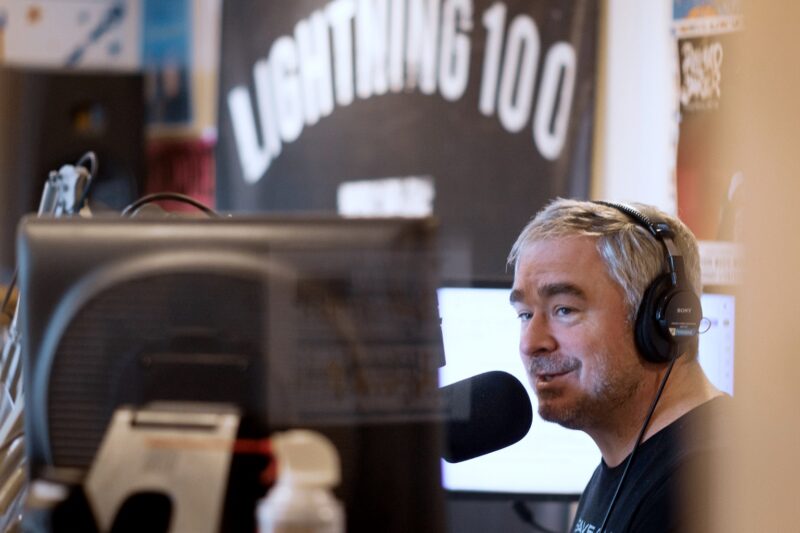
The Lightning 100 mission
Of course his colleagues at the time thought he was crazy. The heritage of radio broadcasting in the United States is strong and well established. With this heritage of course comes etiquette and unspoken standards and operating guidelines. “The sentiment amongst the management and station directors at that time was that any artist worth playing would already have a record deal. Of course this couldn’t be further from the truth.” It seems that, at this particular juncture, Lightning 100 flowered into the contemporary bastion of Nashville community spirit that it is today.
“The truth is, the more that you investigate and promote new and unsigned acts, the better the scene gets.”
Dan’s point suddenly seems pertinent when considering that the entire ethos of truly independent radio stems from a vehement resistance against ‘selling-out’. Supporting and promoting unsigned bands for the simple reason that their songs are great ties in perfectly with this philosophy.
“There are certain bands that will never get a big deal but they’ve written some great songs, and we will play them ‘cos we believe in them. And it’s just so fun ‘cos we’ve been building these acts together with our audience. It cultivates such a strong sense of community and kinship amongst ourselves, our listeners and the artists we support.”
Dan is keen to emphasise his strong connection with the Lightning 100 listenership and has fostered strong bonds with many individuals who frequently call in over the years during his show.
“I’m really grateful that I get to talk to the audience so much. I do a live air shift five days a week and give out prizes, which really strengthens my connection with the listeners.”
Dan’s pride in this special rapport built up over more than 20 years of broadcasting is captivating. The gratification he and his listeners enjoy illuminates the nuances of the radio experience – and the stark contrast between that and listening to playlists on Spotify and other streaming platforms.
“You can have a good experience on Spotify but the feeling of becoming part of a radio community is just impossible to replicate. People come through and live in Nashville for a while to study then move to Ohio or whatever, but continue to listen to our shows. It’s so interesting ‘cos you don’t necessarily get to interact with our dedicated fans, they know me so well but I don’t know them!”
Music Policy
“So one really cool thing we did […] was have these music meetings. There weren’t really any rules, basically members of the public could just come down to the studio and sit alongside label reps, radio pluggers and artist managers. It was such a mixed bag – everyone had a say and everyone wanted to hear their favourite songs on the station. Sometimes artists even came down and pitched their own songs. That’s how we discovered Philip Michael Scales.”
This democratisation of the curation process lies at the nucleus of Lightning 100’s success, in a hypercompetitive city where the music industry is truly ubiquitous.
”We’d play the songs that people showed up to pitch; that the staff wanted us to play – we’d listen to music for two hours together and vote on it all. And you see bands and artists having high scores week after week with different people coming. That’s where the magic happens.”
Music lovers young and old are transported to a different realm, adorned with their own personal sonic nostalgia gathered over years of listenership and long-term relationships forged with hosts and DJs. The anonymity in an electronic society where we are fed what we are believed to want somewhat removes this precious vestige of artisanship – the radio DJ as both an informed selector, and a custodian of the community.
“The difference between us and other stations is that we’re not making decisions out of fear. Many corporate stations only play songs that they know listeners will like. They’re like, ‘this song is popular on other stations, so it will be popular for our listeners too.’ We don’t do that – we dont have to do that and for that I’m grateful.”
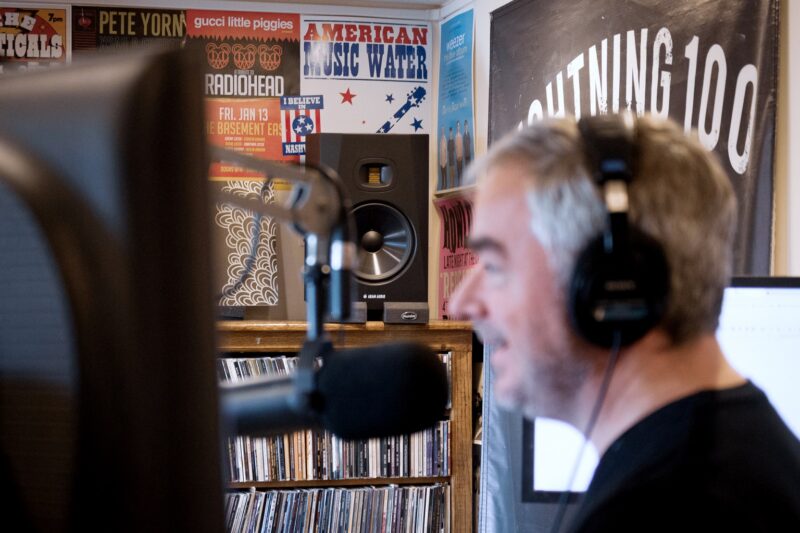
Equipment
“Our setup is pretty much the same as it was in 1990 when we started out, except our ADAM Audio T8Vs. […] They’re the best ones we’ve ever had. Everyone comes in and comments on how great it sounds. We were recording the other day and used them to show an artist their song played on the radio for the first time. They just couldn’t believe how good it sounded. That was a special moment.”
“There was an upgrade from an analog to a digital studio console at some point but that’s about it.” Dan is very proud to mention however that despite the vintage equipment Lightning 100 was in fact one the first radio stations to stream online. “We were already on the internet in ‘96.”
We spoke to Lightning 100 as part of the ADAM Audio Community Radio series, a new project exploring the worlds of broadcasters and their journey with ADAM Audio products.
